Text

Nutrient-dense meal prep recipes that are both healthy and delicious -
1. Quinoa and Roasted Vegetable Bowls:
- Cook quinoa according to package instructions.
- Roast a variety of vegetables (such as bell peppers, zucchini, and broccoli) with olive oil, salt, and pepper in the oven until tender.
- Assemble bowls with quinoa, roasted vegetables, and a protein of your choice (such as grilled chicken or tofu).
- Drizzle with a homemade vinaigrette made with olive oil, lemon juice, and herbs.
2. Turkey and Sweet Potato Chili:
- Brown ground turkey in a large pot with diced onions and garlic.
- Add in diced sweet potatoes, canned tomatoes, black beans, and spices (such as chili powder, cumin, and paprika).
- Let simmer until sweet potatoes are tender and flavors have melded together.
- Divide into individual containers for easy grab-and-go lunches or dinners.
3. Salmon and Asparagus Foil Packets:
- Preheat oven to 400°F.
- Place a piece of salmon fillet on a large piece of aluminum foil.
- Add trimmed asparagus spears, cherry tomatoes, and sliced lemon on top of the salmon.
- Drizzle with olive oil, salt, pepper, and herbs (such as dill or parsley).
- Seal the foil packet and bake in the oven for 15-20 minutes, or until salmon is cooked through.
- Serve with a side of quinoa or brown rice.
4. Chickpea and Vegetable Stir-Fry:
- Sauté diced bell peppers, broccoli, and carrots in a large skillet with olive oil.
- Add in cooked chickpeas and a sauce made from soy sauce, garlic, ginger, and a touch of honey.
- Cook until vegetables are tender and sauce has thickened.
- Serve over brown rice or quinoa for a satisfying and nutrient-dense meal.
These recipes are all packed with nutrients and can be easily prepped ahead of time for quick and healthy meals throughout the week. Enjoy!
#food for thought#food fight#comfort food#fast food#food photography#healthy food#foodie#food#foodpics#foodlover#japanese food#foodmyheart#tw food#lunch recipes#pasta recipes#pasta recipe#salad recipes#soup recipe#recipe#reciprocity#recipies#recipes#healthy salad recipes#cozy fall#cozyhome#cozy cozy#cozy living#autumn cozy#cozy cottage#cozy art
2 notes
·
View notes
Text
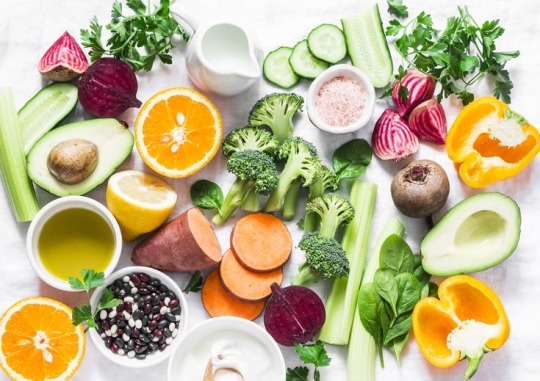
There are several other vitamins and minerals that play important roles in brain function, mood regulation, and memory. Here are some key nutrients that are essential for brain health:
1. B Vitamins: B vitamins, including B6, B9 (folate), and B12, are crucial for brain function and the production of neurotransmitters. They help support cognitive function, mood regulation, and memory. Foods rich in B vitamins include whole grains, leafy green vegetables, nuts, seeds, legumes, eggs, and dairy products.
2. Omega-3 Fatty Acids: Omega-3 fatty acids, specifically docosahexaenoic acid (DHA) and eicosapentaenoic acid (EPA), are important for brain health and cognitive function. They are essential for building and maintaining brain cell membranes and are thought to help support neurotransmitter function. Sources of omega-3 fatty acids include fatty fish (such as salmon, mackerel, and sardines), flaxseeds, chia seeds, and walnuts.
3. Magnesium: Magnesium is involved in hundreds of biochemical reactions in the body, including those related to brain function. It plays a role in neurotransmitter regulation, mood stabilization, and memory. Magnesium-rich foods include leafy green vegetables, nuts, seeds, whole grains, and legumes.
4. Zinc: Zinc is an important mineral for brain health and neurotransmitter function. It is involved in the regulation of mood, memory, and cognitive function. Good sources of zinc include meat, shellfish, nuts, seeds, and legumes.
5. Vitamin D: Vitamin D is essential for overall brain health and cognitive function. It plays a role in neurotransmitter production and mood regulation. Vitamin D can be obtained through exposure to sunlight and through foods such as fatty fish, eggs, and fortified dairy products.
Incorporating a balanced diet rich in these nutrients, along with regular physical activity, adequate sleep, and stress management, can help support overall brain health and cognitive function.
#healthy food#food for thought#food fight#comfort food#fast food#food photography#foodie#food#foodpics#foodlover#japanese food#foodmyheart#tw food#lunch recipes#pasta recipes#pasta recipe#recopilación#salad recipes#soup recipe#recipe#reciprocity#recipies#recipes#healthy salad recipes#cozy fall#cozyhome#cozy cozy#cozy living#autumn cozy#cozy art
5 notes
·
View notes
Text

Healthy and nutritious homemade ice cream -
Ingredients:
- 2 ripe bananas, sliced and frozen
- 1 cup frozen berries (such as strawberries, blueberries, or raspberries)
- 1/2 cup plain Greek yogurt
- 1 tablespoon honey or maple syrup (optional)
- 1 teaspoon vanilla extract
Instructions:
1. Place the frozen bananas and berries in a blender or food processor.
2. Add the Greek yogurt, honey or maple syrup (if using), and vanilla extract.
3. Blend until smooth and creamy, scraping down the sides of the blender as needed.
4. Serve immediately for a soft-serve consistency, or transfer to a container and freeze for 1-2 hours for a firmer texture.
5. Enjoy your healthy and nutritious homemade ice cream!
This recipe is dairy-free, gluten-free, and refined sugar-free, making it a guilt-free treat that is packed with vitamins, minerals, and antioxidants from the fruit and yogurt. You can also customize this recipe by adding other ingredients such as nuts, seeds, or chocolate chips for added texture and flavor.
#healthy food#food for thought#food fight#food food food#comfort food#fast food#food photography#foodie#food#foodpics#foodlover#japanese food#foodmyheart#tw food#lunch recipes#pasta recipes#pasta recipe#salad recipes#soup recipe#recipe#reciprocity#recipies#recipes#healthy salad recipes#cozy fall#cozyhome#cozy cozy#cozy living#autumn cozy#cozy art
18 notes
·
View notes
Text
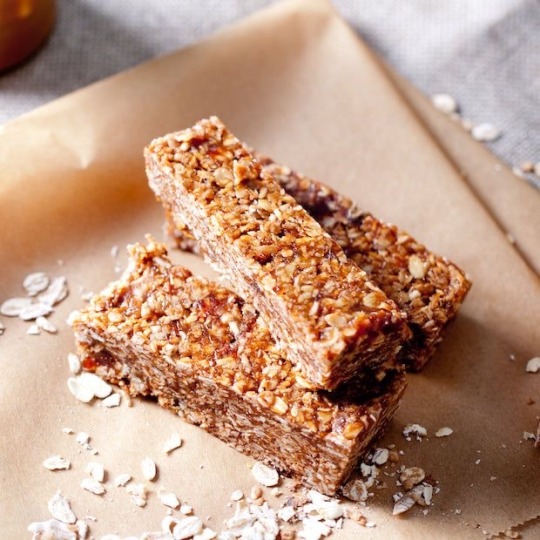
Healthy homemade protein bar -
Ingredients:
- 1 cup rolled oats
- 1/2 cup protein powder (such as whey, pea, or hemp protein)
- 1/2 cup almond butter or peanut butter
- 1/4 cup honey or maple syrup
- 1/4 cup chopped nuts or seeds (such as almonds, walnuts, chia seeds, or pumpkin seeds)
- 1/4 cup dried fruit (such as raisins, cranberries, or chopped apricots)
- 1 teaspoon vanilla extract
- Pinch of salt
Instructions:
1. In a large mixing bowl, combine the rolled oats, protein powder, chopped nuts or seeds, and dried fruit.
2. In a small saucepan, heat the almond butter or peanut butter, honey or maple syrup, vanilla extract, and salt over low heat until smooth and well combined.
3. Pour the almond butter mixture over the dry ingredients and mix well to combine.
4. Press the mixture into a lined baking dish or pan, spreading it out evenly.
5. Refrigerate for 1-2 hours, or until firm.
6. Cut into bars or squares using a sharp knife.
7. Store the protein bars in an airtight container in the refrigerator for up to one week.
These homemade protein bars are a great option for a healthy and nutritious snack or post-workout fuel. They are packed with protein, fiber, healthy fats, and natural sweeteners, making them a satisfying and energizing treat. You can also customize this recipe by adding other ingredients such as dark chocolate chips, coconut flakes, or cinnamon for added flavor and texture.
#healthy food#food for thought#food fight#comfort food#fast food#food photography#foodie#food#foodpics#foodlover#japanese food#foodmyheart#tw food#lunch recipes#pasta recipes#pasta recipe#salad recipes#soup recipe#recipe#reciprocity#recipies#recipes#healthy salad recipes#cozy fall#cozyhome#cozy cozy#cozy living#autumn cozy#cozy art#cozy mystery
5 notes
·
View notes
Text

Simple and healthy breakfast recipe that is both nutritious and delicious -
Avocado Toast with Egg
Ingredients:
- 1 ripe avocado
- 2 slices of whole grain bread
- 2 eggs
- Salt and pepper to taste
- Optional toppings: sliced tomatoes, feta cheese, red pepper flakes, or fresh herbs
Instructions:
1. Toast the slices of whole grain bread until golden brown.
2. While the bread is toasting, mash the ripe avocado in a small bowl and season with salt and pepper.
3. In a non-stick skillet, cook the eggs to your liking (fried, scrambled, poached, or boiled).
4. Spread the mashed avocado onto the toasted bread slices.
5. Top each avocado toast with a cooked egg.
6. Season with additional salt and pepper, and add any optional toppings of your choice.
7. Serve the avocado toast with egg hot and enjoy your healthy and nutritious breakfast!
This breakfast recipe is high in fiber, healthy fats, and protein, making it a satisfying and balanced meal to start your day. Avocado provides heart-healthy monounsaturated fats, while eggs are a great source of protein and essential nutrients. Whole grain bread adds fiber and complex carbohydrates for sustained energy.
#food for thought#food fight#comfort food#fast food#food photography#healthy food#foodie#food#foodpics#foodlover#japanese food#foodmyheart#tw food#lunch recipes#pasta recipes#pasta recipe#salad recipes#soup recipe#recipe#reciprocity#recipies#recipes#healthy salad recipes#cozy fall#cozyhome#cozy cozy#cozy living#autumn cozy#cozy art#cozy mystery
14 notes
·
View notes
Text

Meal prep breakfast recipes -
1. Overnight Oats:
Ingredients:
- 1 cup rolled oats
- 1 cup milk (dairy or plant-based)
- 1 tablespoon chia seeds
- 1 tablespoon honey or maple syrup
- Fresh fruit, nuts, or seeds for topping
Instructions:
1. In a mason jar or container, combine rolled oats, milk, chia seeds, and sweetener of choice.
2. Stir well, cover, and refrigerate overnight.
3. In the morning, top with fresh fruit, nuts, or seeds before serving.
2. Egg Muffins:
Ingredients:
- 6 eggs
- 1/2 cup diced vegetables (bell peppers, spinach, tomatoes, etc.)
- 1/4 cup shredded cheese
- Salt and pepper to taste
Instructions:
1. Preheat oven to 350°F (180°C) and grease a muffin tin.
2. In a bowl, whisk eggs and season with salt and pepper.
3. Divide diced vegetables and cheese among the muffin cups.
4. Pour egg mixture over the vegetables and cheese.
5. Bake for 20-25 minutes or until set. Allow to cool before storing in the fridge.
3. Greek Yogurt Parfait:
Ingredients:
- Greek yogurt
- Granola
- Mixed berries (blueberries, strawberries, raspberries)
- Honey or maple syrup
Instructions:
1. Layer Greek yogurt, granola, and mixed berries in a jar or container.
2. Drizzle with honey or maple syrup.
3. Store in the fridge and enjoy for a quick and nutritious breakfast option.
4. Breakfast Burritos:
Ingredients:
- Whole wheat tortillas
- Scrambled eggs
- Black beans
- Salsa
- Avocado slices
- Shredded cheese
Instructions:
1. Fill tortillas with scrambled eggs, black beans, salsa, avocado slices, and shredded cheese.
2. Roll into burritos and wrap in foil or plastic wrap for easy grab-and-go breakfasts.
5. Chia Seed Pudding:
Ingredients:
- 1/4 cup chia seeds
- 1 cup milk (dairy or plant-based)
- 1 tablespoon honey or maple syrup
- 1/2 teaspoon vanilla extract
- Fresh fruit or nuts for topping
Instructions:
1. In a jar or container, mix chia seeds, milk, sweetener, and vanilla extract.
2. Stir well and refrigerate for at least 4 hours or overnight.
#healthy food#food for thought#food fight#comfort food#fast food#food photography#foodie#food food food#food#foodpics#foodlover#japanese food#foodmyheart#tw food#healthy salad recipes#lunch recipes#pasta recipes#pasta recipe#salad recipes#soup recipe#recipe#reciprocity#recipies#recipes#cozy autumn#cozy fall#cozyhome#cozy cozy#cozy living#autumn cozy
2 notes
·
View notes
Text

Recipe for a homemade Coca Cola alternative that is healthier and nutritious:
Ingredients:
- 1 cup sparkling water
- 1/4 cup freshly squeezed orange juice
- 1 tablespoon pure maple syrup
- 1/2 teaspoon vanilla extract
- Pinch of cinnamon
Instructions:
1. In a glass, combine the sparkling water, orange juice, maple syrup, vanilla extract, and cinnamon.
2. Stir well until all ingredients are mixed together.
3. Taste the mixture and adjust the sweetness or flavor as needed.
4. Add ice cubes if desired and garnish with a slice of orange or a sprinkle of cinnamon.
5. Enjoy your homemade, healthy Coca Cola alternative!
This homemade Coca Cola alternative is free of artificial colors, flavors, and high fructose corn syrup, making it a healthier option for a fizzy, sweet drink. The addition of orange juice provides vitamin C and natural sweetness, while the cinnamon adds a warm and comforting flavor.
#healthy food#food for thought#food fight#comfort food#fast food#food photography#foodie#food#foodpics#foodlover#japanese food#foodmyheart#tw food#healthy salad recipes#lunch recipes#pasta recipes#pasta recipe#salad recipes#reciprocity#soup recipe#recipe#recipies#recipes#cozy autumn#cozy fall#cozyhome#cozy cozy#cozy living#autumn cozy#cozy art
6 notes
·
View notes
Text
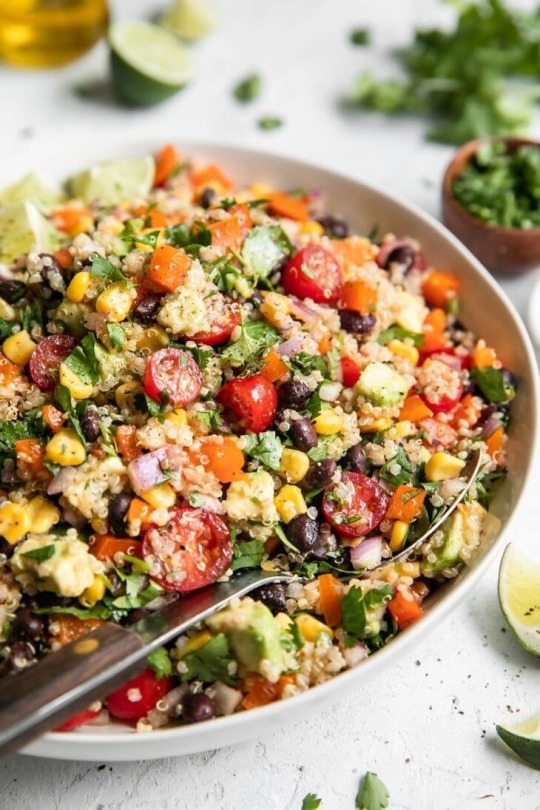
Meal Prep Recipes for Lowering Blood Pressure and Improving Heart Health:
Recipe 1: Grilled Lemon Herb Chicken with Roasted Vegetables
Ingredients:
- 4 boneless, skinless chicken breasts
- 2 tablespoons olive oil
- Juice of 1 lemon
- 2 cloves garlic, minced
- 1 teaspoon dried oregano
- 1 teaspoon dried thyme
- Salt and pepper, to taste
- 1 medium zucchini, sliced
- 1 red bell pepper, sliced
- 1 yellow bell pepper, sliced
- 1 small red onion, sliced
- 1 tablespoon balsamic vinegar
- Fresh parsley, for garnish
Instructions:
1. In a bowl, mix olive oil, lemon juice, garlic, oregano, thyme, salt, and pepper. Add chicken breasts to the marinade and let sit for at least 30 minutes.
2. Preheat grill or grill pan over medium-high heat. Grill chicken for 6-8 minutes per side, or until cooked through.
3. Preheat oven to 400°F (200°C). On a baking sheet, arrange zucchini, bell peppers, and red onion. Drizzle with olive oil, balsamic vinegar, salt, and pepper. Roast in the oven for 20-25 minutes, or until vegetables are tender.
4. Divide grilled chicken and roasted vegetables into meal prep containers. Garnish with fresh parsley.
5. Store in the refrigerator for up to 4 days. Reheat before serving.
Recipe 2: Quinoa and Black Bean Salad with Avocado Dressing
Ingredients:
- 1 cup quinoa, rinsed
- 1 can black beans, drained and rinsed
- 1 red bell pepper, diced
- 1 cup cherry tomatoes, halved
- 1/4 cup red onion, finely chopped
- 1/4 cup fresh cilantro, chopped
- 1 avocado
- Juice of 1 lime
- 1 clove garlic, minced
- 2 tablespoons olive oil
- Salt and pepper, to taste
Instructions:
1. Cook quinoa according to package instructions. Let cool.
2. In a large bowl, combine cooked quinoa, black beans, red bell pepper, cherry tomatoes, red onion, and cilantro.
3. In a blender or food processor, combine avocado, lime juice, garlic, olive oil, salt, and pepper. Blend until smooth.
4. Pour avocado dressing over the quinoa salad and toss to combine.
5. Divide the salad into meal prep containers. Store in the refrigerator for up to 3 days.
These meal prep recipes are high in fiber, lean protein, healthy fats, vitamins, and minerals, all of which are beneficial for lowering blood pressure and improving heart health. Enjoy these delicious and nutritious meals throughout the week.
#healthy food#food for thought#food fight#comfort food#fast food#food photography#foodie#food#foodpics#foodlover#japanese food#foodmyheart#tw food#healthy salad recipes#lunch recipes#pasta recipes#pasta recipe#salad recipes#soup recipe#recipe#reciprocity#recipies#recipes#cozy autumn#cozy fall#cozyhome#cozy cozy#cozy living#autumn cozy#cozy art
13 notes
·
View notes
Text

There are several countries known for having some of the healthiest cuisines in the world, characterized by fresh, whole foods, a variety of fruits and vegetables, lean proteins, and balanced flavors. Some of these countries include:
1. Japan: The traditional Japanese diet is based on fish, seafood, rice, tofu, vegetables, and fermented foods like miso and kimchi. Japanese cuisine is known for its emphasis on fresh, seasonal ingredients and simple, flavorful dishes.
2. Greece: The Mediterranean diet, which is commonly found in countries like Greece, is rich in olive oil, whole grains, fruits, vegetables, nuts, seeds, and fish. The diet is high in antioxidants, healthy fats, and fiber, and is associated with numerous health benefits.
3. Italy: Italian cuisine is known for its emphasis on fresh, high-quality ingredients such as tomatoes, olive oil, garlic, herbs, and whole grains. The Mediterranean diet, common in Italy, is associated with a lower risk of heart disease and other chronic conditions.
4. South Korea: Korean cuisine features a wide variety of fermented foods, vegetables, lean proteins, and grains. Kimchi, a staple in Korean cuisine, is a fermented vegetable dish that is rich in probiotics and has numerous health benefits.
5. India: Indian cuisine is characterized by a wide array of spices, legumes, vegetables, whole grains, and lean proteins like lentils and chickpeas. Many traditional Indian dishes are vegetarian or vegan, making them rich in plant-based nutrients.
6. Thailand: Thai cuisine is known for its bold flavors, fresh herbs, and aromatic spices. Thai dishes often feature a balance of sweet, sour, salty, and spicy flavors, and incorporate plenty of fresh fruits, vegetables, and seafood.
7. Morocco: Moroccan cuisine is rich in spices, herbs, nuts, seeds, vegetables, and lean proteins like fish and poultry. Tagines, a traditional Moroccan stew, often contain a variety of vegetables and are cooked slowly to infuse flavors.
#healthy food#food for thought#food fight#comfort food#fast food#food photography#foodie#food#foodpics#foodlover#japanese food#foodmyheart#tw food#healthy salad recipes#lunch recipes#pasta recipes#pasta recipe#salad recipes#soup recipe#recipe#reciprocity#recipies#recipes#cozy autumn#cozy fall#cozyhome#cozy cozy#cozy living#autumn cozy#cozy art
10 notes
·
View notes
Text

Homemade Electrolyte Drink with Coconut Water
Ingredients:
- 1 cup coconut water
- 1 cup water
- 1/4 cup freshly squeezed lemon juice
- 1/4 cup freshly squeezed lime juice
- 2 tablespoons honey
- 1/8 teaspoon sea salt
Instructions:
1. In a large pitcher, combine the coconut water, water, lemon juice, lime juice, honey, and sea salt.
2. Stir well until the honey and sea salt are completely dissolved.
3. Taste the mixture and adjust the sweetness or saltiness as needed.
4. Chill the homemade Gatorade in the refrigerator for at least 30 minutes before serving.
5. Serve over ice and enjoy as a refreshing and healthy electrolyte drink.
This homemade Gatorade-like drink is packed with electrolytes from the coconut water and sea salt, making it a great alternative to store-bought sports drinks. It's also free of artificial colors and flavors, making it a healthier option for hydration during physical activity.
#healthy food#food for thought#food fight#comfort food#fast food#food photography#foodie#food#foodpics#foodlover#japanese food#foodmyheart#tw food#healthy salad recipes#lunch recipes#pasta recipes#pasta recipe#salad recipes#soup recipe#recipe#reciprocity#recipies#recipes#cozy autumn#cozy fall#cozyhome#cozy cozy#cozy living#autumn cozy#cozy art
14 notes
·
View notes
Text

Miso is a traditional Japanese seasoning made from fermented soybeans, rice, or barley. This fermented food offers a variety of health benefits due to the presence of beneficial probiotics, enzymes, vitamins, and minerals that are produced during the fermentation process. Some of the potential benefits of miso include:
1. Probiotic support: Miso is a natural source of probiotics, such as beneficial bacteria and yeast strains, that can help promote a healthy balance of gut microbiota. Consuming miso regularly may support digestion, improve gut health, and boost the immune system.
2. Digestive health: The probiotics and enzymes found in miso can aid in digestion, promote nutrient absorption, and support overall digestive health. Miso can help maintain a healthy gut environment, reduce inflammation, and alleviate digestive issues such as bloating, gas, and indigestion.
3. Immune system support: A healthy gut microbiome is essential for a strong immune system. The probiotics in miso can help strengthen the immune system, reduce inflammation, and support overall immune function.
4. Nutrient-rich: Miso is a good source of vitamins (such as B vitamins), minerals (such as manganese, zinc, and copper), and protein. These nutrients are important for overall health, immune function, energy metabolism, and cell function.
5. Antioxidant properties: The fermentation process used to make miso can increase the availability of antioxidants, which help protect cells from damage caused by free radicals and oxidative stress. Antioxidants can help reduce inflammation, support heart health, and promote overall well-being.
6. Heart health: The probiotics, antioxidants, and minerals in miso may help support heart health by reducing inflammation, lowering cholesterol levels, and promoting overall cardiovascular health.
7. Bone health: Miso is a good source of nutrients like calcium and vitamin K, which are important for bone health and may help support bone density and reduce the risk of osteoporosis.
Incorporating miso into your diet as a seasoning for soups, marinades, dressings, and other dishes can provide a range of health benefits. It's important to choose traditionally fermented miso to ensure the presence of live probiotic cultures. As with any food, moderation is key, and individual responses to miso may vary. If you have specific health concerns or medical conditions, it's advisable to consult with a healthcare provider or a registered dietitian before making significant changes to your diet.
#food for thought#food fight#comfort food#fast food#food photography#healthy food#foodie#food#foodpics#foodlover#japanese food#foodmyheart#tw food#lunch recipes#pasta recipes#pasta recipe#salad recipes#soup recipe#recipe#reciprocity#recipies#recipes#healthy salad recipes#cozyhome#cozy fall#cozy cozy#cozy living#autumn cozy#cozy art#cozy mystery
4 notes
·
View notes
Text

Kimchi is a traditional Korean dish made from fermented vegetables, most commonly cabbage and radishes, along with a variety of seasonings and spices. This fermented food offers a range of health benefits due to its probiotic content, as well as the nutrients and antioxidants found in the vegetables and seasonings. Some of the potential benefits of kimchi include:
1. Probiotic support: Kimchi is rich in beneficial probiotic bacteria, such as Lactobacillus, which can help promote a healthy balance of gut microbiota. Consuming kimchi regularly may support digestion, improve gut health, and strengthen the immune system.
2. Digestive health: The probiotics in kimchi can aid in digestion, promote nutrient absorption, and support overall digestive health. Kimchi can help maintain a healthy gut environment, reduce inflammation, and alleviate digestive issues such as bloating, gas, and indigestion.
3. Immune system support: A healthy gut microbiome is linked to a strong immune system. The probiotics in kimchi can help enhance immune function, reduce inflammation, and support overall immune health.
4. Nutrient-rich: Kimchi is a good source of vitamins A, B vitamins, vitamin C, and minerals like calcium, iron, and potassium. These nutrients are essential for overall health, immune function, and energy metabolism.
5. Antioxidant properties: The vegetables and seasonings used in kimchi contain antioxidants that help protect cells from damage caused by free radicals and oxidative stress. Antioxidants can help reduce inflammation, support heart health, and promote overall well-being.
6. Weight management: Some studies suggest that the probiotics and fiber found in kimchi may help support weight management by promoting a healthy gut microbiome, improving digestion, and enhancing nutrient absorption.
7. Heart health: The fiber, probiotics, and antioxidants in kimchi may help support heart health by lowering cholesterol levels, reducing inflammation, and promoting cardiovascular health.
Incorporating kimchi into your diet as part of a balanced and varied meal plan can provide a range of health benefits. It's important to choose traditionally fermented kimchi to ensure the presence of live probiotic cultures. As with any food, moderation is key, and individual responses to kimchi may vary.
#food for thought#food fight#comfort food#fast food#healthy food#food photography#foodie#food#foodpics#foodlover#japanese food#foodmyheart#tw food#lunch recipes#pasta recipes#pasta recipe#salad recipes#soup recipe#recipe#reciprocity#recipies#healthy salad recipes#recipes#cozy fall#cozyhome#cozy cozy#cozy living#good soup#autumn cozy#cozy art
8 notes
·
View notes
Text

Sauerkraut is a fermented cabbage dish that is rich in beneficial probiotics, vitamins, and minerals. Fermented foods like sauerkraut offer a variety of health benefits due to the presence of beneficial bacteria, enzymes, and nutrients that are produced during the fermentation process. Some of the potential benefits of sauerkraut include:
1. Probiotic support: Sauerkraut is a natural source of probiotics, such as Lactobacillus bacteria, that can help promote a healthy balance of gut microbiota. Consuming sauerkraut regularly may help support digestion, improve gut health, and boost the immune system.
2. Digestive health: The probiotics and enzymes found in sauerkraut can aid in digestion, promote nutrient absorption, and support overall digestive health. Sauerkraut can help maintain a healthy gut environment and reduce the risk of digestive issues such as bloating, gas, and indigestion.
3. Immune system support: A healthy gut microbiome is essential for a strong immune system. The probiotics in sauerkraut can help strengthen the immune system, reduce inflammation, and support overall immune function.
4. Nutrient-rich: Sauerkraut is a good source of vitamins C and K, as well as potassium, calcium, and fiber. These nutrients are important for overall health, immune function, bone health, and digestive health.
5. Antioxidant properties: The fermentation process used to make sauerkraut can increase the availability of antioxidants, which help protect cells from damage caused by free radicals and oxidative stress.
6. Weight management: Some studies suggest that the probiotics found in sauerkraut may help support weight management by promoting a healthy gut microbiome, improving digestion, and enhancing nutrient absorption.
7. Heart health: The fiber, probiotics, and antioxidants in sauerkraut may help support heart health by reducing inflammation, lowering cholesterol levels, and promoting overall cardiovascular health.
Incorporating sauerkraut into your diet as part of a balanced and varied meal plan can provide a range of health benefits. It's important to choose unpasteurized or traditionally fermented sauerkraut to ensure the presence of live probiotic cultures. As with any food, moderation is key, and individual responses to sauerkraut may vary.
#food for thought#food fight#comfort food#fast food#healthy food#food photography#foodie#food#foodpics#foodlover#japanese food#foodmyheart#tw food#lunch recipes#pasta recipes#pasta recipe#salad recipes#soup recipe#recipe#reciprocity#recipies#recipes#healthy salad recipes#cozy fall#cozyhome#cozy cozy#cozy living#autumn cozy#cozy art#cozy mystery
4 notes
·
View notes
Text
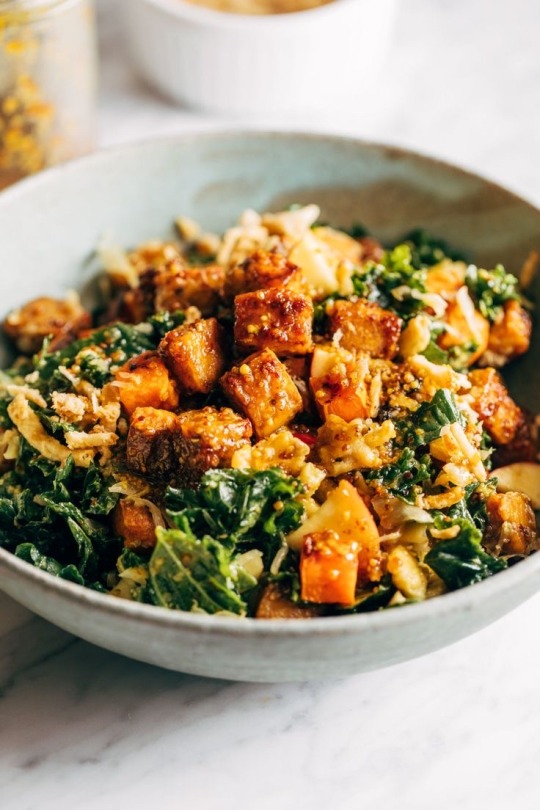
Tempeh is a traditional Indonesian fermented soybean product that offers a variety of health benefits due to its nutrient content, probiotics, and plant-based protein. Some of the potential benefits of tempeh include:
1. Plant-based protein: Tempeh is a rich source of plant-based protein, making it an excellent meat alternative for vegetarians and vegans. Protein is essential for building and repairing tissues, supporting muscle health, and maintaining overall body function.
2. Probiotic support: Tempeh is a fermented food that contains beneficial probiotic bacteria, such as Rhizopus mold, that can help promote a healthy balance of gut microbiota. Consuming tempeh regularly may support digestion, improve gut health, and boost the immune system.
3. Digestive health: The probiotics and enzymes found in tempeh can aid in digestion, promote nutrient absorption, and support overall digestive health. Tempeh can help maintain a healthy gut environment, reduce inflammation, and alleviate digestive issues such as bloating, gas, and indigestion.
4. Nutrient-rich: Tempeh is a good source of nutrients, including protein, fiber, vitamins (such as B vitamins), minerals (such as iron, calcium, and magnesium), and antioxidants. These nutrients are important for overall health, immune function, energy metabolism, and cell function.
5. Heart health: Tempeh is low in saturated fat and cholesterol and contains heart-healthy unsaturated fats. The fiber, protein, and nutrients in tempeh may help support heart health by lowering cholesterol levels, reducing inflammation, and promoting overall cardiovascular health.
6. Weight management: The high protein and fiber content of tempeh can help promote satiety, reduce hunger cravings, and support weight management goals.
7. Bone health: Tempeh is a good source of calcium and magnesium, which are important minerals for bone health. Consuming tempeh regularly may help support bone density and reduce the risk of osteoporosis.
Incorporating tempeh into your diet as a meat substitute or protein source can provide a range of health benefits. It's important to choose high-quality tempeh and prepare it in a variety of dishes to enjoy its nutritional benefits. As with any food, moderation is key, and individual responses to tempeh may vary.
#healthy food#food for thought#food fight#comfort food#fast food#food photography#foodie#food#foodpics#foodlover#japanese food#foodmyheart#tw food#lunch recipes#pasta recipes#pasta recipe#salad recipes#soup recipe#recipe#reciprocity#recipies#healthy salad recipes#recipes#cozy fall#cozyhome#cozy cozy#cozy living#autumn cozy#cozy art#cozy mystery
5 notes
·
View notes
Text
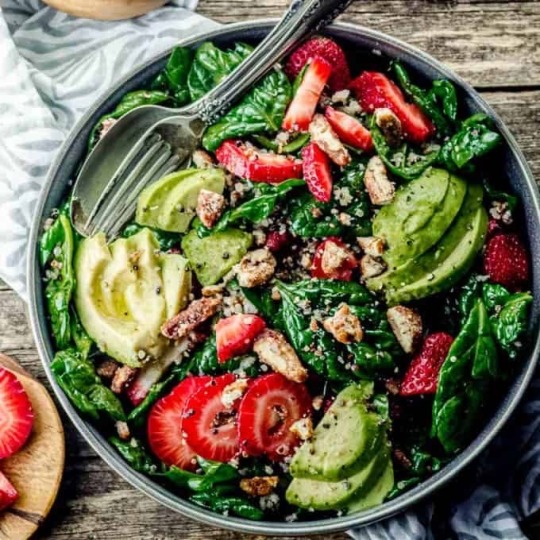
Simple and nutritious recipe that includes several ingredients known for their cell-supportive properties -
Superfood Salad Recipe
Ingredients:
- 2 cups mixed leafy greens (such as spinach, kale, arugula)
- 1/2 cup mixed berries (blueberries, strawberries, raspberries)
- 1/4 cup mixed nuts and seeds (almonds, walnuts, chia seeds)
- 1/2 avocado, sliced
- 1/2 cup cooked quinoa
- 4 oz grilled salmon or tofu (for plant-based option)
- Dressing: 1 tbsp olive oil, 1 tbsp balsamic vinegar, 1 tsp honey, salt, and pepper to taste
Instructions:
1. In a large bowl, combine the mixed leafy greens, berries, nuts, seeds, avocado, and cooked quinoa.
2. Top the salad with grilled salmon or tofu for added protein and omega-3 fatty acids.
3. In a small bowl, whisk together the olive oil, balsamic vinegar, honey, salt, and pepper to make the dressing.
4. Drizzle the dressing over the salad and toss to combine.
5. Serve the superfood salad as a nutrient-rich meal that supports cell health and provides essential vitamins, minerals, antioxidants, and healthy fats.
This recipe combines a variety of nutrient-dense foods that are known for their cell-supportive properties, including leafy greens rich in vitamins and minerals, berries packed with antioxidants, nuts and seeds for healthy fats and protein, avocado for vitamin E, quinoa for fiber and protein, and salmon or tofu for additional protein and omega-3 fatty acids. Enjoying a balanced diet with a variety of colorful fruits, vegetables, whole grains, lean proteins, and healthy fats can help provide the essential nutrients needed to support cell repair and overall health.
#healthy food#food for thought#food fight#comfort food#fast food#food photography#foodie#food#foodpics#foodlover#japanese food#foodmyheart#tw food#lunch recipes#pasta recipes#pasta recipe#salad recipes#soup recipe#recipe#reciprocity#recipies#recipes#healthy salad recipes#cozy fall#cozyhome#cozy cozy#cozy living#autumn cozy#cozy art#cozy mystery
5 notes
·
View notes
Text

Eating fresh, whole foods is crucial for maintaining optimal health and well-being. Fresh foods, such as fruits, vegetables, whole grains, lean proteins, and healthy fats, are packed with essential nutrients like vitamins, minerals, antioxidants, and fiber that are vital for the proper functioning of the body. Here are some reasons why eating fresh foods is important for our overall health:
1. Nutrient density: Fresh foods are rich in essential nutrients that our body needs to function properly. These nutrients play a key role in supporting various bodily functions, including energy production, metabolism, immune function, and cell repair.
2. Bioavailability: Fresh foods contain nutrients in their natural form, which are more readily absorbed and utilized by the body compared to processed or refined foods. Our bodies are intuitive and can extract and absorb nutrients more efficiently from fresh foods, helping to repair, build, and maintain our bodies.
3. Digestive health: Fresh foods are often easier to digest and can help support a healthy digestive system. The fiber found in fruits, vegetables, and whole grains promotes regular bowel movements, supports gut health, and can reduce the risk of digestive issues like constipation and bloating.
4. Hydration: Many fresh foods, such as fruits and vegetables, have high water content, which helps keep our bodies hydrated and supports overall health. Staying hydrated is essential for proper digestion, nutrient absorption, and maintaining energy levels.
5. Reduced intake of additives and preservatives: Fresh foods are free from artificial additives, preservatives, and other harmful chemicals that are commonly found in processed foods. By choosing fresh, whole foods, we can reduce our exposure to these potentially harmful substances and support our body's natural detoxification processes.
Overall, fresh foods provide the essential nutrients our body needs to repair, build, and maintain itself. By prioritizing a diet rich in fresh, whole foods, we can support our overall health and well-being, improve our energy levels, boost our immune system, and reduce the risk of chronic diseases.
#food for thought#food fight#comfort food#fast food#healthy food#food photography#foodie#food#foodpics#foodlover#japanese food#foodmyheart#tw food#healthy salad recipes#pasta recipe#salad recipes#soup recipe#recipe#reciprocity#recipies#recipes#pasta recipes#lunch recipes#cozy fall#cozyhome#cozy cozy#cozy living#autumn cozy#cozy art#cozy mystery
5 notes
·
View notes
Text

Foods For Healthy Respiratory Function -
Maintaining a healthy diet is important for overall respiratory health, as certain nutrients can help support lung function and reduce the risk of respiratory problems. Here are some of the best foods for respiratory health:
1. Fruits and vegetables: Fruits and vegetables are rich in antioxidants, vitamins, and minerals that can help support lung health. Some of the best choices include berries, citrus fruits, leafy greens, carrots, and bell peppers.
2. Omega-3 fatty acids: Foods high in omega-3 fatty acids, such as fatty fish (salmon, mackerel, sardines), flaxseeds, chia seeds, and walnuts, have anti-inflammatory properties that can help reduce inflammation in the respiratory tract.
3. Nuts and seeds: Nuts and seeds are good sources of vitamin E, which has been linked to improved lung function. Almonds, sunflower seeds, and hazelnuts are particularly rich in vitamin E.
4. Whole grains: Whole grains like oats, quinoa, and brown rice are high in fiber and can help reduce inflammation in the body, including the respiratory system.
5. Garlic and onions: Garlic and onions have anti-inflammatory and antimicrobial properties that can help support respiratory health and boost the immune system.
6. Green tea: Green tea contains antioxidants called catechins that can help reduce inflammation and protect against respiratory infections.
7. Turmeric: Turmeric contains a compound called curcumin, which has anti-inflammatory and antioxidant properties that can benefit respiratory health.
It's important to maintain a balanced diet that includes a variety of nutrient-rich foods to support respiratory health. Additionally, staying hydrated by drinking plenty of water and avoiding processed foods, sugary drinks, and foods high in saturated fats can also help promote healthy lung function.
#food for thought#comfort food#fast food#food fight#healthy food#food photography#foodie#food#foodpics#foodlover#japanese food#foodmyheart#tw food#healthy salad recipes#lunch recipes#pasta recipes#pasta recipe#salad recipes#soup recipe#recipe#reciprocity#recipies#recipes#cozy autumn#cozy fall#cozyhome#cozy cozy#cozy living#autumn cozy#cozy art
1 note
·
View note